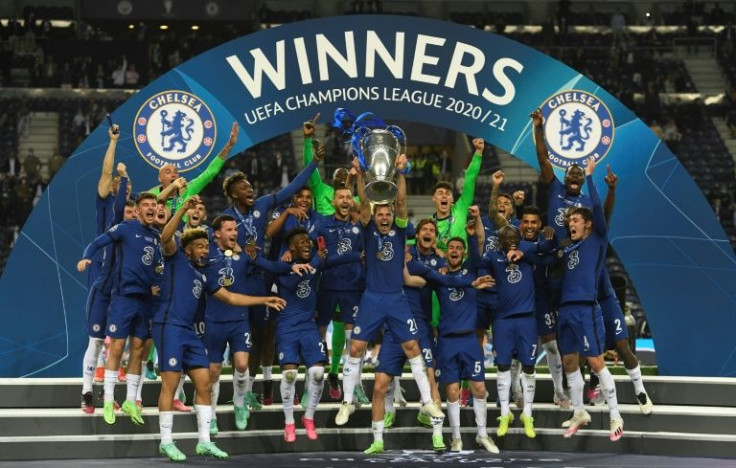Premier League Riches Sow Fear Among Champions League Rivals
As Barcelona and Spanish champions Atletico Madrid scrap for a place in the Champions League last 16 this week, the Premier League's four participants can take it easy knowing their places in the knockout stages are already guaranteed.
Liverpool, Manchester City and Manchester United have all secured top spot in their groups with a game to spare, while defending champions Chelsea will join them with victory over Zenit Saint Petersburg.
The success of English clubs this season continues a worrying trend for the rest of Europe.
Two of the past three Champions League finals have been all-English affairs, contested by four different clubs.
If results on the field were not galling enough for the rest of Europe, the Premier League's ability to attract record-breaking television rights deals from around the globe has fuelled fears the gap between the top English clubs and the rest will only grow in coming years.
The English top-flight has long enjoyed its position as the wealthiest league in the world on the back of bumper TV deals for the domestic market.

But even as the value of those rights has stalled over the past two tenders, the international market has ensured there is still steady growth.
Last month, the Premier League secured a reported $2.7 billion (?2 billion) renewal with US broadcaster NBC for a six-year rights deal.
That followed another ?2 billion overseas six-year deal for the Nordic countries, starting in 2022.
By comparison, Spain's La Liga celebrated a $1.4 billion deal in May with ESPN for US rights that runs for the next eight years.
The relative size of those deals means the impact of the coronavirus pandemic has been felt very differently across the continent.

In the most recent transfer window, Premier League clubs' net spend of ?560 million was more than 10 times that of La Liga (?55 million), Serie A (?50 million) and Ligue 1 (?15 million), while Bundesliga clubs made a net profit of an estimated ?35 million thanks to Jadon Sancho's ?73 million move from Borussia Dortmund to Manchester United.
Sancho followed Kai Havertz and Timo Werner in swapping Germany for England with another Dortmund pair, Jude Bellingham and Erling Haaland, tipped to make the same move next year.
Bayer Leverkusen CEO Fernando Carro told AFP the Bundesliga risked becoming merely a development league for the Premier League if the current trend continued.
"We tried to buy a player in the summer and in the end a promoted side from the Premier League was able to pay more money and a higher salary than us, a top-four side in Germany," said Carro.
"The Premier League has so much more money and resources than any other country. This is not good for us."
Spanish clubs have suffered from the talent drain. Between 2013 and 2020 La Liga boasted the best UEFA coefficient for performance in European competition.
This week financially stricken Barca, Atletico, Sevilla and Villarreal are all in serious peril of bowing out at the group stage of the Champions League. Exits would deal another heavy economic blow to a league that has already mortgaged a share of future TV rights to private equity firm CVC for a cash injection.
Leverkusen's Carro warned differences were becoming stark.
"We could double or triple our TV income and we still wouldn't close the gap," he warned.
The failed European Super League project was designed to bring the superpowers of Spanish and Italian football back on a level playing field.
That plan was foiled when the six English clubs involved quickly withdrew after a furious backlash from fans earlier this year.
But Real Madrid, Barcelona and Juventus have refused to give up the fight as they seek fresh income streams that their domestic competitions do not provide.
Others may soon come back to the table should the Premier League clubs continue to pull away and establish themselves as unchallengable giants in the European game.
© Copyright AFP 2024. All rights reserved.







